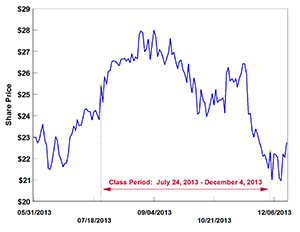US law firm Robbins Geller has filed a class action lawsuit against video game publisher EA, after the bugtastic Battlefield 4 launch that adversely impacted EA’s share price.
RG’s lawsuit hopes to ‘recover damages’ on behalf of investors who bought shares in EA between July 24th and December 4th, charging the publisher “and certain of its officers and directors with violations of the Securities Exchange Act of 1934.” According to the law firm, EA issued “materially false and misleading statements” between July and December that highlighted “the purported strength of the Company’s rollout of version 4 of its all-important Battlefield video game series, which had provided approximately 11% of its revenues in fiscal 2012.” Continuing:
Based on the purported strength of the Battlefield 4 rollout then underway, defendants issued strong fiscal 2014 financial guidance for the Company and actually increased that guidance on October 29, 2013. The price of Electronic Arts’ stock steadily climbed on these statements, reaching a Class Period high of $28.13 per share by August 23, 2013 and allowing certain of Electronic Arts’ senior executives to sell their Electronic Arts stock at artificially inflated prices.
The problem, of course, is that Battlefield 4‘s launch was incredibly buggy:
(a) Battlefield 4 was riddled with bugs and multiple other problems, including downloadable content that allowed players access to more levels of the game, a myriad of connectivity issues, server limitations, lost data and repeated sudden crashes, among other things; (b) as a result, Electronic Arts would not achieve a successful holiday season 2013 rollout of Battlefield 4; (c) the performance of the Electronic Arts unit publishing Battlefield 4 was so deficient that all other projects that unit was involved in had to be put on hold to permit it to focus its efforts on fixing Battlefield 4; and (d) as a result, Electronic Arts was not on track to achieve the financial results it had told the market it was on track to achieve during the Class Period.
Especially on PS4:
The complaint further alleges that, on November 15, 2013, the day Sony released its new Play Station 4 (“PS4”) console, it was disclosed that players of Electronic Arts’ games were being subjected to multiple glitches and significant crashes when attempting to play Electronic Arts’ titles on PS4. The price of Electronic Arts stock fell on these disclosures, declining more than 7% from a close of $25.96 per share on November 14, 2013 to close at $24.06 per share on November 15, 2013. Then, on December 4, 2013, it was disclosed through discussions defendants had with video game bloggers that due to bugs, connectivity issues, server limitations, and various other problems plaguing Battlefield 4, Electronic Arts had been forced to indefinitely halt the Battlefield 4 rollout and other projects until the problems with Battlefield 4 could be fixed. The price of Electronic Arts shares declined on this news from a close of $22.34 on December 4, 2013 to close at $21.01 on December 5, 2013, sending the share price down more than 28% from its Class Period high.
Do you think that publishers should face lawsuits for buggy games, or is that a natural risk that should be associated with development? Let us know in the comments below.
[Via]









